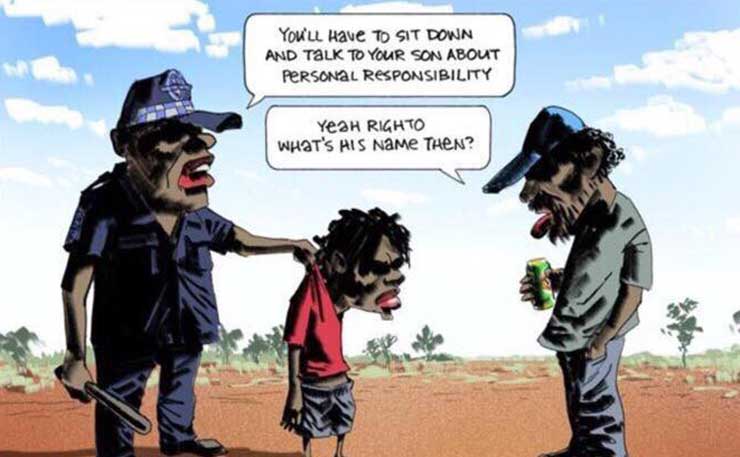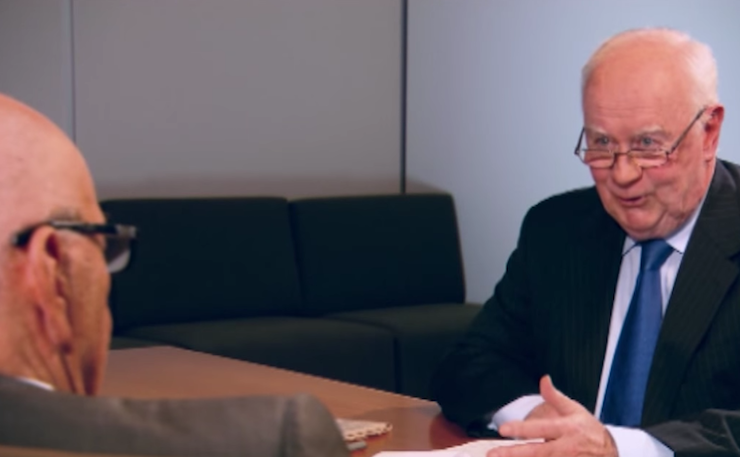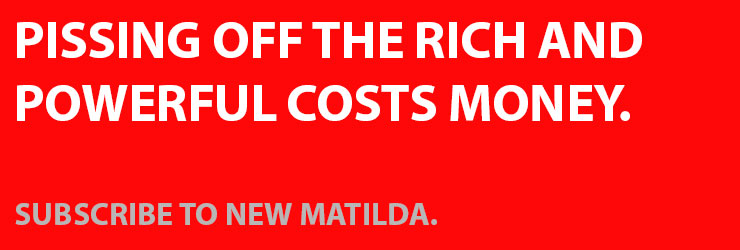Right-wing commentators love complaining about identity politics and freedom of speech. That doesn’t stop them using it to shut down critical voices in a debate, writes Amy McQuire.
Last week, The Australian newspaper’s Paul Kelly penned a critique of the rise of identity politics, which he says has paved the foundation for a “poisonous assault on rational honest debate and the quality of public policy”.
Don’t get me wrong, there are many smart members of the Left who have also raised concerns about the rise of identity politics, for example, see Michael Brull in New Matilda. Brull defines identity politics as “marked by a primacy of identity: belonging to this or that group, and the presumed lived experience that comes with that identity”. He says, in that sense, because a person with the identity or lived experience is seen as the authoritative voice, identity politicians can be seen as “anti-intellectual”. It is “politically neutral” and, rather than resting on “political values”, depends on “loyalty to a particular group”, which is why it is so challenging to many members of the Left.
But where Brull’s piece is smart, Kelly’s is completely hypocritical.
Paul Kelly claims that the application of identity politics “veers towards narcissism, censoring of public debate, vicious campaigns of intimidation and a diminished public square. It is extraordinary to see how many institutions and prominent figures buckle before the campaigns of identity politics, too weak to stand on principle.”
In this instance, Kelly claims the rise of identity politics has strangled public debate stemming from the Four Corners report on NT juvenile justice which shocked Australia. He claims there was an “extreme reluctance of politicians and media to mention, let alone canvass, the underlying causes” until the subject was broached by his selected Aboriginal voices.
Kelly claims those ‘underlying causes’ are “the breakdown of the Indigenous social and family order through a range of issues including family dislocation, neglect, violence, parental abuse and drunkenness.”
Of course, if you were to examine the underlying causes of these social issues, you would also have to examine the ongoing effects of colonisation over 200 years, and the impact of transgenerational trauma. Otherwise, the only other explanation is that Aboriginal parents are biologically more inclined to violence and social breakdown – and to believe that would be incredibly racist.
Nevertheless, Kelly thinks that ‘rational debate’ – in other terms, ‘debate which fits his worldview’ – is only allowed to emerge following statements like those of academic Marcia Langton, who claimed the actual issue we should be talking about was not race but the children “who have been failed by their families to such an extent that they became child criminals”. According to Kelly, critiques by Noel Pearson and Langton allowed the sanctioning of an “honest debate”.
That ‘honest debate’ came in the form of cartoonist Bill Leak’s picture depicting an “irresponsible Indigenous father who couldn’t recall the name of his son”.

According to Kelly: “Leak pointed out in Friday’s paper his purpose in the cartoon: if you think things are pretty crook for children in the Don Dale Youth Detention Centre, you should have a look at the homes they come from. It wasn’t hard to get. But the fascinating thing about Leak’s piece was the feedback he got that people couldn’t understand his cartoon.”
The feedback of course was that Leak’s drawing was a racist depiction of Aboriginal fatherhood, and only continued the historical repetition of tropes that Aboriginal parents do not love their children. That outrage was validated. Leak’s cartoon deeply hurt a people who have been continually dehumanised in print over the course of colonisation – a dehumanisation which helped justify the stealing of land – the original sin upon which Australia was built.
In responding to the outrage, the Australian’s Paul Whittaker used selected quotes from Langton and Pearson to justify the racist cartoon, which of course sounds a lot like identity politics.
It’s obvious that for all its grandstanding, the Right will gladly utilise identity politics for its own benefit as well, as long as it can manipulate the views of one section of a group to suit its own agenda.
If identity politics is ‘anti-intellectual’ it’s nothing new for the Right which wears anti-intellectualism like a badge, pinned to shock jocks like Andrew Bolt.
Commentators like Bolt love slamming the Left as elite, inner-city latte sippers, even though they often have high paying media jobs and are the embodiment of elitism.
For Kelly to claim the Left has a problem with identity politics is to overlook his own paper’s abuse of it, which is often far more insidious and vitriolic.
In Aboriginal affairs, the paper has used the Aboriginal leaders that most closely espouse its own viewpoints as a weapon to drown out any other form of debate, even in the face of evidence.
Take the elevation of Warlpiri woman Bess Price and the conservative ‘part-Aboriginal’ Anthony Dillon, as well as former ALP National President Warren Mundine, Pearson, and Langton. All of these ‘leaders’ are used by the paper to silence intellectual debate, including when it comes from other Aboriginal people who are somehow less entitled to an opinion, often because their criticism apparently doesn’t come from the bush.
Need an example? Take the outrageous front-page campaign penned primarily by the former Australian journalist and current ABC Radio National host Patricia Karvelas against Aboriginal academic Larissa Behrendt. The ideological campaign was based around Behrendt’s criticism on Twitter of Bess Price. The paper published a piece from Langton at the time, claiming that there was a “political rift between urban, left-wing, activist Aboriginal women and the bush women who witness the horrors of life in their communities, much of which is arrogantly denied by the former.”
Behrendt’s outspoken criticism of policies like the NT intervention was rendered inferior due to the fact she “lives in Sydney in relative luxury as compared with Bess’ situation”. Her identity as an urban blackfella meant that she was unable to comment on government policy.
That’s identity politics fitting both Kelly’s definition and Michael Brull’s.
But from Kelly’s perspective identity politics is only a problem when the Left use it. He is blind to his newspaper’s own crimes.
The Right’s defence of identity politics can also be seen in other recent outrages – like the defence of Sonia Kruger after she called for a ban on Muslim immigration. First of all, why does she feel qualified in the first place to have a say anything about issues she has no evidence-based knowledge of? It can’t be because she is “a mother”, because there are many Muslim mothers in Australia who would not support her at all. It must be because of something else – and that ‘something else’ is her identity as a white woman.
Aboriginal academic Dr Chelsea Bond told me on 98.9 FM’s Let’s Talk programme this week: “How do these people get jobs? How do they get asked about something they know nothing about? Can’t we have informed commentators? Or is being white a sufficient qualification to be a commentator on mainstream television?
“It would appear so. If you look at Steve Price, if we look at (Sam) Newman, (Eddie) Maguire.”
It’s hard to doubt that logic. Maybe the core issue surrounding the rise of identity politics is not that it gives oppressed groups ammunition to use in debates based on their lived experience, but that it gives certain commentators the platform to espouse uninformed, bigoted opinions based on their privileged identity, predominately as white men.
Paul Kelly’s central thesis is that identity politics is pushing the real issues in Aboriginal affairs under the rug, for fear of “offending”. But those ‘real issues’ are only the ones backed by their selected Aboriginal spokespeople – the type that help validate their prejudice. When faced with a much-needed backlash they retreat instead of engaging, and hit back even more forcefully.
Who has the victim complex here? And who is guiltier of strangling sensible, honest debate?
Donate To New Matilda
New Matilda is a small, independent media outlet. We survive through reader contributions, and never losing a lawsuit. If you got something from this article, giving something back helps us to continue speaking truth to power. Every little bit counts.





